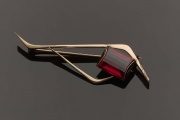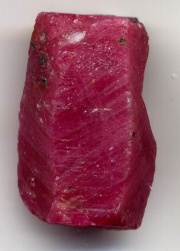Difference between revisions of "Ruby"
| (12 intermediate revisions by the same user not shown) | |||
| Line 1: | Line 1: | ||
| − | [[File:2005.572-SC167747.jpg|thumb| | + | [[File:2005.572-SC167747.jpg|thumb|Ruby pin<br>MFA# 2005.572]] |
== Description == | == Description == | ||
| − | + | [[File:rubycrystalwk.jpg|thumb|Uncut ruby]] | |
A red transparent [[gemstone|gemstone]] composed of [[corundum|corundum]] (aluminum oxide). Rubies range in color from a deep rose red to a pale pink due to small amounts of [[chromium|chromium]] impurities. They are primarily found in Myanmar (formerly Burma), Kashmir, India, Sri Lanka, Thailand, Zimbabwe, Tanzania, Kenya, Madagascar and the U.S.(North Carolina). Rubies were rarely used in antiquity, probably because of their rarity and extreme hardness. A large clear ruby is more valuable than a diamond of equivalent size. Synthetic rubies were first made in 1837 by fusing aluminum oxide with chromium oxide. They are used in watches, scientific instruments, masers, and lasers. | A red transparent [[gemstone|gemstone]] composed of [[corundum|corundum]] (aluminum oxide). Rubies range in color from a deep rose red to a pale pink due to small amounts of [[chromium|chromium]] impurities. They are primarily found in Myanmar (formerly Burma), Kashmir, India, Sri Lanka, Thailand, Zimbabwe, Tanzania, Kenya, Madagascar and the U.S.(North Carolina). Rubies were rarely used in antiquity, probably because of their rarity and extreme hardness. A large clear ruby is more valuable than a diamond of equivalent size. Synthetic rubies were first made in 1837 by fusing aluminum oxide with chromium oxide. They are used in watches, scientific instruments, masers, and lasers. | ||
| − | |||
== Synonyms and Related Terms == | == Synonyms and Related Terms == | ||
red corundum; aluminum oxide; pigeon blood; rubin (Dan., Pol., Sven.); Rubin (Deut.); rubis (Fr.); robijn (Ned.); rubi (Esp.,Port.) | red corundum; aluminum oxide; pigeon blood; rubin (Dan., Pol., Sven.); Rubin (Deut.); rubis (Fr.); robijn (Ned.); rubi (Esp.,Port.) | ||
| + | [[File:Cut_Rubywk.jpg|thumb|Cut ruby]] | ||
| − | [[[SliderGallery rightalign| | + | [[[SliderGallery rightalign|Ruby, 785nm, 100mw.TIF~Raman]]] |
| − | |||
== Physical and Chemical Properties == | == Physical and Chemical Properties == | ||
| − | + | * Composition = Al<sub>2</sub>O<sub>3</sub>::Cr | |
* Trigonal crystal system. Strongly pleochroic. | * Trigonal crystal system. Strongly pleochroic. | ||
* Fracture= uneven or conchoidal. | * Fracture= uneven or conchoidal. | ||
| − | * Streak = white. Luster = vitreous. | + | * Streak = white. |
| + | * Luster = vitreous. | ||
* With high temperatures, ruby becomes green but returns to red on cooling. | * With high temperatures, ruby becomes green but returns to red on cooling. | ||
| − | * Fluoresces | + | * Fluoresces a weak to vivid red. May phosphoresce. |
| − | |||
* Mohs Hardness = 9.0 | * Mohs Hardness = 9.0 | ||
| − | * Density = 3.96-4.05 | + | * Density = 3.96-4.05 g/ml |
* Refractive Index = 1.76-78 | * Refractive Index = 1.76-78 | ||
| − | + | * Birefringence = 0.008 - 0.010 | |
== Comparisons == | == Comparisons == | ||
[[media:download_file_436.pdf|Properties of Common Gemstones]] | [[media:download_file_436.pdf|Properties of Common Gemstones]] | ||
| − | + | ==Resources and Citations== | |
| − | + | * Gem Identification Lab Manual, Gemological Institute of America, 2016. | |
| − | == | ||
| − | |||
| − | |||
| − | |||
| − | |||
| − | |||
| − | |||
| − | |||
| − | |||
* G.S.Brady, ''Materials Handbook'', McGraw-Hill Book Co., New York, 1971 Comment: p. 682 | * G.S.Brady, ''Materials Handbook'', McGraw-Hill Book Co., New York, 1971 Comment: p. 682 | ||
| − | |||
* Jack Odgen, ''Jewellery of the Ancient World'', Rizzoli International Publications Inc., New York City, 1982 | * Jack Odgen, ''Jewellery of the Ancient World'', Rizzoli International Publications Inc., New York City, 1982 | ||
| − | |||
* R.F.Symmes, T.T.Harding, Paul Taylor, ''Rocks, Fossils and Gems'', DK Publishing, Inc., New York City, 1997 | * R.F.Symmes, T.T.Harding, Paul Taylor, ''Rocks, Fossils and Gems'', DK Publishing, Inc., New York City, 1997 | ||
| − | |||
* A.Lucas, J.R.Harris, ''Ancient Egyptian Materials and Industries'', Edward Arnold Publishers Ltd., London, 4th edition, 1962 Comment: 500-50 BC | * A.Lucas, J.R.Harris, ''Ancient Egyptian Materials and Industries'', Edward Arnold Publishers Ltd., London, 4th edition, 1962 Comment: 500-50 BC | ||
| − | + | * ''Encyclopedia Britannica'', http://www.britannica.com Comment: "ruby." (Accessed 14 Sept. 2005) | |
| − | * ''Encyclopedia Britannica'', http://www.britannica.com Comment: "ruby." | ||
| − | |||
* C.W.Chesterman, K.E.Lowe, ''Audubon Society Field Guide to North American Rocks and Minerals'', Alfred A. Knopf, New York, 1979 | * C.W.Chesterman, K.E.Lowe, ''Audubon Society Field Guide to North American Rocks and Minerals'', Alfred A. Knopf, New York, 1979 | ||
| − | + | * Wikipedia: http://en.wikipedia.org/wiki/Ruby (Accessed Sept. 14, 2005) | |
| − | * Wikipedia | ||
| − | |||
* Richard S. Lewis, ''Hawley's Condensed Chemical Dictionary'', Van Nostrand Reinhold, New York, 10th ed., 1993 | * Richard S. Lewis, ''Hawley's Condensed Chemical Dictionary'', Van Nostrand Reinhold, New York, 10th ed., 1993 | ||
| − | |||
* ''Van Nostrand's Scientific Encyclopedia'', Douglas M. Considine (ed.), Van Nostrand Reinhold, New York, 1976 | * ''Van Nostrand's Scientific Encyclopedia'', Douglas M. Considine (ed.), Van Nostrand Reinhold, New York, 1976 | ||
| − | |||
* ''The American Heritage Dictionary'' or ''Encarta'', via Microsoft Bookshelf 98, Microsoft Corp., 1998 | * ''The American Heritage Dictionary'' or ''Encarta'', via Microsoft Bookshelf 98, Microsoft Corp., 1998 | ||
Latest revision as of 14:55, 10 December 2022
Description
A red transparent Gemstone composed of Corundum (aluminum oxide). Rubies range in color from a deep rose red to a pale pink due to small amounts of Chromium impurities. They are primarily found in Myanmar (formerly Burma), Kashmir, India, Sri Lanka, Thailand, Zimbabwe, Tanzania, Kenya, Madagascar and the U.S.(North Carolina). Rubies were rarely used in antiquity, probably because of their rarity and extreme hardness. A large clear ruby is more valuable than a diamond of equivalent size. Synthetic rubies were first made in 1837 by fusing aluminum oxide with chromium oxide. They are used in watches, scientific instruments, masers, and lasers.
Synonyms and Related Terms
red corundum; aluminum oxide; pigeon blood; rubin (Dan., Pol., Sven.); Rubin (Deut.); rubis (Fr.); robijn (Ned.); rubi (Esp.,Port.)
Physical and Chemical Properties
- Composition = Al2O3::Cr
- Trigonal crystal system. Strongly pleochroic.
- Fracture= uneven or conchoidal.
- Streak = white.
- Luster = vitreous.
- With high temperatures, ruby becomes green but returns to red on cooling.
- Fluoresces a weak to vivid red. May phosphoresce.
- Mohs Hardness = 9.0
- Density = 3.96-4.05 g/ml
- Refractive Index = 1.76-78
- Birefringence = 0.008 - 0.010
Comparisons
Properties of Common Gemstones
Resources and Citations
- Gem Identification Lab Manual, Gemological Institute of America, 2016.
- G.S.Brady, Materials Handbook, McGraw-Hill Book Co., New York, 1971 Comment: p. 682
- Jack Odgen, Jewellery of the Ancient World, Rizzoli International Publications Inc., New York City, 1982
- R.F.Symmes, T.T.Harding, Paul Taylor, Rocks, Fossils and Gems, DK Publishing, Inc., New York City, 1997
- A.Lucas, J.R.Harris, Ancient Egyptian Materials and Industries, Edward Arnold Publishers Ltd., London, 4th edition, 1962 Comment: 500-50 BC
- Encyclopedia Britannica, http://www.britannica.com Comment: "ruby." (Accessed 14 Sept. 2005)
- C.W.Chesterman, K.E.Lowe, Audubon Society Field Guide to North American Rocks and Minerals, Alfred A. Knopf, New York, 1979
- Wikipedia: http://en.wikipedia.org/wiki/Ruby (Accessed Sept. 14, 2005)
- Richard S. Lewis, Hawley's Condensed Chemical Dictionary, Van Nostrand Reinhold, New York, 10th ed., 1993
- Van Nostrand's Scientific Encyclopedia, Douglas M. Considine (ed.), Van Nostrand Reinhold, New York, 1976
- The American Heritage Dictionary or Encarta, via Microsoft Bookshelf 98, Microsoft Corp., 1998



